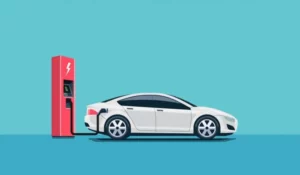Subject:
- GS-2: Governance & Policy Measures – Urban Mobility Strategies, Sustainable Transport
- GS-3: Environment & Economy – Electric Vehicles, Emission Reduction, Renewable Energy

Key Points
Draft EV 2.0 Policy & Goals
- The Delhi government has finalized its Electric Vehicle (EV) 2.0 Policy, awaiting Cabinet approval.
- Targets 95% of newly registered vehicles in Delhi to be electric by 2027.
- Plans a phased replacement of CNG autorickshaws and light motor vehicles with EVs.
Policy Initiatives & Benefits
- Offers financial incentives for purchasing electric two-wheelers, three-wheelers, light commercial vehicles, and trucks.
- Encourages a transition from internal combustion engine (ICE) vehicles to EVs.
- Establishes a dedicated fund for EV promotion, funded by green taxes, pollution fees, and aggregator licensing charges.
- Requires electrification of commercial transport fleets.
- Enhances regulatory frameworks to ensure adherence.
Employment & Skill Enhancement
- Emphasizes job opportunities in EV sales, maintenance, financing, and battery management.
- Introduces government-supported training for EV technicians and drivers.
Insights & Next Steps
- The policy could substantially lower urban air pollution and support national sustainability targets.
- Hurdles include high upfront costs, insufficient charging infrastructure, and supply chain limitations.
- Suggestions: Expand charging station networks, provide sustained financial benefits, and promote domestic EV production.
Mains Practice Question
“Evaluate the role of state-level electric vehicle policies in fostering sustainable urban transportation. Assess the obstacles and propose strategies for successful EV integration in India.”




